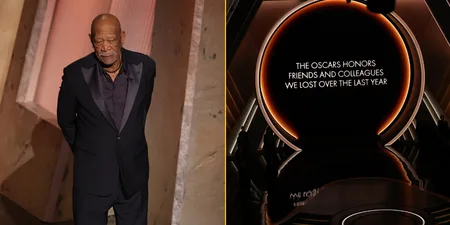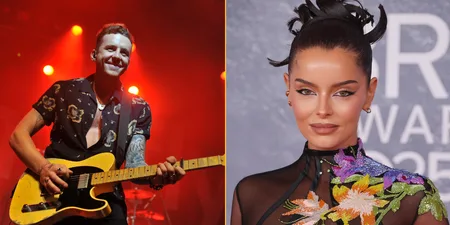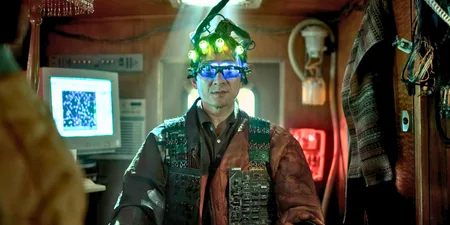Trained ants build a tiny igloo, then drown when the ice is melted by an unattended Bunsen burner. A disembodied scientist’s hand gets increasingly covered in burns as it repeatedly tries to retrieve an egg from boiled water. We are informed that ghosts cannot whistle
Welcome to the world of Look Around You, the cult comedy show that ran on BBC Two between 2002 and 2005. Created by comedians Robert Popper and Peter Serafinowicz, it originally consisted of ten-minute parodies of late 1970s/early 1980s education programming. They were like a portal into a bizarre alternate universe, that felt like our word but was filled strange made-up terms and insane scientific rules. Even now, over fifteen years after it first aired, it remains one of the most unique British comedy shows ever produced.
Robert Popper and Peter Serafinowicz first met in the late 1990s, when they worked together on a one-off project Popper wrote for Matt Lucas and David Walliams (“It was crap,” Popper quickly clarifies, while detailing the history of Look Around You on the phone). Both were early in their career. Popper was a comedy producer who’d written for puppets Zig and Zag, and Serafinowicz had been on Radio 4 and appeared in Spaced.
At the time, Popper was working in the Granada comedy department. “They had the most amazing library [of old programmes] where you could go on their system and call up tapes,” he explains, “and they’d give you a VHS. We used to just watch shit programmes from the 1970s and 80s.” Nowadays it is easy to fall down a YouTube hole and spend hours watching baffling TV from the past. But back in an era where internet speeds meant that streaming video was basically impossible, it took true dedication to seek this stuff out.
The duo soon realised they both were enamoured with a particular niche genre of forgotten television. “We also both remembered talking about the old schools programme we were forced to watch, at school, or when you were ill in bed,” says Popper. “But not the Open University ones with the beards – the ones with the weird blue backgrounds.”
“They felt like a dream. I remember them sort of terrifying me, but being weirdly drawn to them as well. They were really boring, but they were so creepy and strange.”
Since 1957, the BBC had produced educational programming to be shown in schools, airing either during the daytime or in the middle of the night, with ITV and Channel 4 also doing the same at various times. A shared memory of several generations of school kids is having a TV on wheels rolled in, when the teacher couldn’t be bothered to teach, and instead forcing you to watch a decade-old VHS about oxbow lakes, or the periodic table.
Inspired by this mixture of nostalgia and televisual anthropology, in 2001 Popper and Serafinowicz decided to write their own take on those old educational films, just something to entertain themselves. “It was never like a TV idea,” says Popper, but they soon found themselves actually making the show for real.
Serafinowicz brought in Tim Kirkby, a director he knew, and they started work on the zero-budget production (Kirby is now one of the most in-demand TV comedy directors, having helmed episodes of Veep, Brooklyn Nine-Nine and the pilot of Fleabag).
“We just got a bunch of people together and shot everywhere illegally,” explains Popper. “We found this old petrol station in Camden – a really old, weird one. We turned up at six in the morning, took down loads of their stuff, filmed there, and put all the stuff back up. And as we left we just saw the guys that work there pull in, with no idea that we’d just turned it into the outside of a factory with two men carrying a tray with a big lump of wobbly jelly.”
The 22-minute short Calcium was shot over five weeks. “We spent ages editing it in various places,” says Popper, “and then we did a big screening of it where we invited everyone we knew, and everyone we looked up to.” A buzz started to build around it, it screened at several film festivals, and they started passing out video tapes of it. Even though it was never intended as a pilot, Talkback Productions approached them about turning into a series.
They went to the BBC, who were looking to fill ten-minute late evening slots with new comedy talent. “They said ‘We’ll give you six’. So I just went ‘Can we have ten episodes?’ And they said ‘Eight’. Don’t know why I asked.”
Look Around You debuted on BBC Two on October 10 2002. It was like no other comedy show that had aired on British television. It is a show with barely any human faces in it. Instead, we get close ups of hands, equipment, and lots of pencils pointing at things. It has disconnected, creepy, otherworldly feeling.
The narration is delivered completely straight, not by a recognisable comedian, but by experienced voice actor Nigel Lambert – a veteran of over 50 BBC audio books and now probably best known as the voice of the ‘Papa’ puppet in those slightly terrifying Dolmio pasta sauce commercials. Despite a stream of gibberish (“Thanks, ants. Thants.”) and nonsense terminology (“Anti-Gary Gum”), the veneer of seriousness never cracks – which of course just makes it all so much funnier.
There is a lot of just staring at objects for a long time – something that Popper found especially funny. “Just the idea of having a tiny lump of sulphur, zooming in. We had our screening of the first series at the IMAX, and we filled the biggest screen in Europe with this yellow lump of sulphur. That made us laugh.”
That madness rubbed off on the creators as well. “We did two days at the end that were just close ups and slow zooms, in and out of equipment. Bottles, and test tubes, just for all the extra detail we needed. And I practically went insane from boredom. It was unbearable. We were in a basement in front of this horrible blue background. Slow zoom in, slow zoom out. And you’re just filming glass for two days. That was hell.”
The production team scoured markets and jumble sales for authentic looking costumes and props, and it perfectly captures the feeling of the shows they are parodying. “We made them how they would have made them,” says Popper. “We had no money. We wouldn’t do more than two or three takes. If there was a hair in the film gate, or a bit of fluff, we kept it in. Someone opened the camera, which can let light in and fuck the shot up, but we said ‘Let’s leave it, it’ll be good’. Things like that.”

“The philosophy was – they’ve shot it purely for education, never for aesthetic reasons, just information. So if we always shoot it for that, it will end up feeling right.”
And while Look Around You is never locked down to a particular date, it perfectly invokes the Britain of the late 1970s and early 1980s. “It was an era that we quite liked watching, Britain looked absolutely disgusting then,” say Popper. “And it was a really turbulent time. I remember growing up then. Running away from skinheads, and being beaten up and chased. It was grim, and on all the programmes you’d just see a lot of wasteland.
“We wanted it to feel grubby and real and just reflecting what we remembered from that time. It was horrible, but in a lovely horrible way, if you see what I mean. Aesthetically it is horrible, but we still love the look of it.”
Despite – or maybe because of its obtuseness – Look Around You was a hit amongst critics and their comedy peers. The show was nominated for a BAFTA in 2003. The Simpsons’ creator Matt Groening called it “one of the funniest shows I’ve ever seen”, and cult US anti-comedy team Tim Heidecker and Eric Wareheim were also fans. It aired on Adult Swim in the US, and despite the precise Britishness of the show, the banality of terrible educational television resonated with international audiences.
In spite of the reaction, it still took nearly three years for the show to return to British television screens. They were keen to make more, but the BBC saw them as a launching pad to make something else. “The BBC said those ten minute slots are for trying out things, they don’t do second series of them,” says Popper. “So I just badgered them, and eventually they asked if we had any 30 minute ideas. With humans in it.”
All of which culminated in 2005, when we finally got the second series of Look Around You. Instead of ten-minute faux-educational shorts, it was a half-hour show which had, as the BBC had asked, “humans in it”. Set in the same undefined early 1980s milieu, it was now a fake pop-science magazine show, in the vein of the Beeb’s Tomorrow’s World, which ran from 1965 to 2003.
Popper and Serafinowicz were now endearingly cheesy hosts of the show, presenting studio segments and VTs on surreal, ridiculous science topics, including ‘Petticoat 5’, the first computer for women, and a competition to predict what music will sound like in the year 2000 (including the second series’ most memorable moment, a fantastically polite introduction to rap music for 1980s BBC viewers).
Joining Popper and Serafinowicz as presenters were Olivia Colman, a few years into Peep Show and a decade away from Oscar glory, and Josie d’Arby. The casting of d’Arby was particularly interesting, as she was best known for being an actual TV host, a familiar face from the likes if Top of the Pops and The Big Breakfast. As well as making the show feel that bit more real, her casting had an added bonus, as Popper said she gave him and Serafinowicz TV presenting lessons to nail down delivering the inane links and banter.
The second series of Look Around You is definitely a lot of fun, but it failed to resonate in the same way. “Sometimes it really works, sometimes… I don’t know,” admits Popper. “I prefer the first series. I like the fact there are no people in it, and it is creepier, and I hadn’t seen anything like that before.”
And that was it for Look Around You, outside of a single new sketch made for a reunion event at the BFI Southbank in 2012. Both Popper and Serafinowicz have had plenty of success separately following the show. Popper has written five series of Friday Night Dinner for Channel 4, and Serafinowicz has been in everything from Guardians of the Galaxy to Amazon’s The Tick, as well as his own fondly remember sketch show.
“No one would commission a third series. It’s just not going to happen,” says Popper on any possible return. When asked, he briefly entertains the idea of pitching Look Around You to Netflix, or crowdfunding a new series, but quickly dismisses it. “It was just a very free, fun stupid time, that you’d like to recapture, but if you did it again it would be like ‘Oh, it was better that first time’.”
Popper looks back on the first series as one of the most fun periods of his comedy career, being given almost complete freedom to make whatever weirdness they wanted. “We were in a dark basement, no-one knew what we were doing. I don’t think the BBC ever even saw the scripts,” says Popper. “If you look at the scripts, what comments are you going to say? ‘I think this lump of sulphur should be larger’. I think they just let us make it.”
As we finish our conversation, he imagines an alternative universe where there was no format change, and Popper and Serafinowicz just continued making Look Around You, and beavering away with sulphur and test tubes, without a care in the world. “Me and Pete loved making it. We wanted to do more. I’d still be happy making them today. If we made a hundred, I’d be happy.”









































